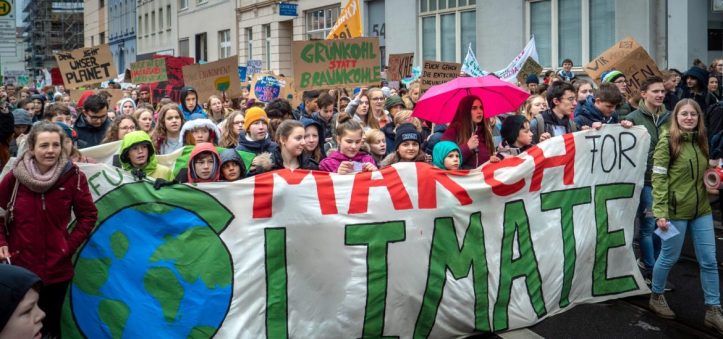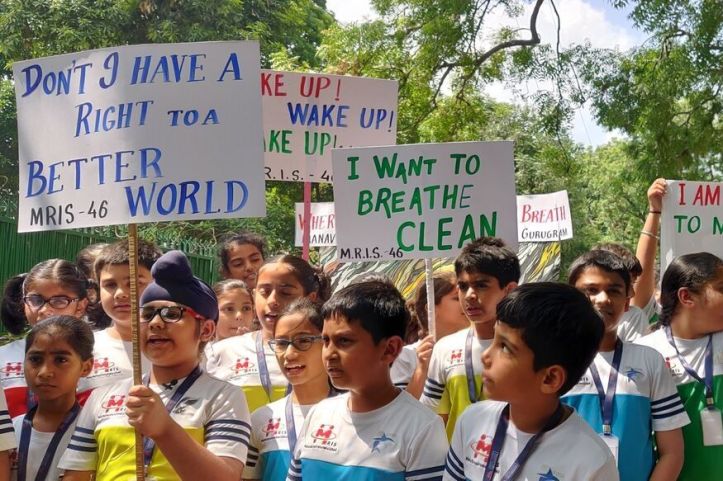Over the last few weeks, Greta Thunberg, the 16-year old climate activist from Sweden, has made headlines. Her emotive speech to the world leaders at the United Nations Climate Summit followed by her nomination for the Nobel Peace Prize has catapulted her already famous “Fridays for Future” movement to another level of fame and also, scrutiny.
As an environmentalist, I have been observing Thunberg’s speeches for a while now. No form of activism should escape scrutiny, in my opinion and the opinion of many people I have spoken with. Thunberg’s speeches and her movement, after much thought and deliberation, has left me with a greater sense of apprehension than optimism.
To claim that the current climate crisis is caused by human GHG emissions is, frankly, inaccurate.
The Fridays for Future movement
Her journey started by protesting the lack of climate action and policy initiatives taken by world governments, including her own. In a TEDx talk she delivered, she claims to see this problem particularly clearly: if fossil fuels are driving the current climate crisis, simply stop. Immediately. She saw no reason to remain in school when the science was “so clear” about the doomsday trajectory the world is currently taking, dropped out.

Since then, she has been supported by various NGOs and other initiatives in spreading her message for fast climate action. (Some go so far as to say that Greta has been used by non-profits for their own agendas. A fascinating account of this perspective can be found here.) Her ardent belief in the “irrefutable” proof of human-induced climate change combined with her eloquent public speaking drove the popular movement called “Fridays for Future”, where school students boycotted the day’s school and protested in front of policy makers for climate action.
The red flags in her movement
The first red flag was raised in my mind when she put the whole problem of climate policy in a black-and-white sentence: If the science is so clear about climate change, simply stop and change our ways. The world does not work like that! Russian President Vladimir Putin (I realize quoting him about activism is not ideal but I find this appropriate here) observed this when he stated that “nobody seems to have explained to Greta about how complex the world is.” Most environmental activists, in my experience, seek such black-and-white solutions to various environmental issues. And sometimes, its just not possible. The world’s economy is built on resource utilization and fossil fuels, and decades have been spent to create iron-clad policies and incentives for a globalized world built on this model. No amount of overly emotional, accusatory speeches is going to create change overnight, or even in a decade. Climate action will be slow as it has to overcome a lot of political and private inertia.

The second red flag was when I heard her claim of irrefutable science backing human-induced climate change and the resultant environmental problems. Climate is a complex earth process. There is plenty of proof to back that climate has changed in the past and will continue to change in the future. This is regardless of whether or not humans change their ways. But the effect of certain factors controlling climate are much larger than GHG concentration in the atmosphere. For example, a single volcanic eruption today would eject sulphur into the air, which is like an anti-GHG. It would shield the earth from incoming solar radiation, resulting in cooling even if GHG concentration remain over 400 ppm (this is what happened when Mt. Pinatubo erupted in 1991). To claim that the current climate crisis is caused by human GHG emissions is, frankly, inaccurate. It is more accurate to say that the current climate crisis is exacerbated by human GHG emissions. It is quite likely that the earth will continue to warm even if we stopped all emissions today, because the Earth has been in a warming period since the end of the last Ice Age. I find this oversimplification of the climate problem – stating that GHG emissions are the sole reason for climate change and the world will end if we do not stop now – and spewing debatable statistics to be highly misleading. The world is probably not going to end because of this climate crisis. Only our way of life will.
The third and the final red flag, is again, regarding the practicality of her call for action. She forgets (or probably does not understand) that the world does not run on idealism, it runs on aspirations. No matter how much people are told about the menace of vehicular pollution, the social prestige of owning a car is too powerful to overcome. The same is true about owning an air conditioner or a water purifier. How can you go tell someone to not aspire for a more luxurious life, when luxury has been glamorized? However well-meaning her call for action, protests of this kind cannot create behavioral change or alternate incentives.
It’s not all bad…

I will have to commend Thunberg on achieving something that many climate scientists and activists had failed to do. She has managed to firmly place climate action on the political agenda and triggered a public thirst for its knowledge. It has started an awareness movement in the world. Many people living outside the sphere of environmental sciences and policy do not understand or even know about the phenomenon of climate change and its possible impacts. The developing world is slowly starting to experience these problems first-hand. Climate change has had one irrefutable effect: disasters. Droughts and floods have caused havoc in many places, including India, and the larger public are now acutely aware of how the climate around them is changing. And they are starting to talk about it. This conversation is definitely going to make political parties look up and say, “hey, maybe we should talk about this too!”.
All in all, I believe it is likely that there will come a time when climate change deniers would look towards her and say, “Doomsday did not happen the way you said it would!” or something along those lines because of the vigorous stand she is taking on this issue. Climate science is still evolving and is highly volatile, because of the sheer number of variables at play.
What is accepted is our resource over-utilization and the resultant environmental pollution, habitat destruction and loss of biodiversity. I believe that the world is better off first attacking these issues with urgency. In this regard, I believe her predictions may well come out to be true if we don’t change our ways.

I would have appreciated this post even more if the good points would also have been clearly highlighted just like the red flags.
There is a greater need of optimistic posts!
LikeLike
I think there is an even greater need for cautious optimism or even realism in today’s world, rather than mindless optimism/pessimism.
LikeLiked by 1 person
I would agree. Realism is extremely important. And critiques are crucial too. However, the tone can certainly be made a little lighter to make it sound like a reality check rather than an author’s pessimism.
In any case, I like the consistency of the posts and also the effort to bring something new everytime.
Looking forward to many more posts!
LikeLiked by 1 person
The post was not meant to be diplomatic. It was a strong critique.
But thanks! Keep reading 🙂
LikeLiked by 1 person
Hi. Interesting post. I think you would get great value from reading some material on the typical Aspergerian perspective. Seeing the world in black and white and dismissing emotion-driven irrational human actions is part and parcel of this condition. For me these ‘red flags’ aren’t flaws at all, they are the very reason her arguments have resonated with the public.
LikeLike
I see, I didn’t know the problems associated with the condition she has.
I agree that these arguments resonate with the public, but it’s not going to cause the effect in policy that she intends to. But they are the very reason for the positives I’ve mentioned in the latter half of the post.
LikeLike
[…] year, I described certain “red flags” in Greta Thunberg’s approach to climate action. I explained that she is being unrealistic, she does not consider the nuances of the climate change […]
LikeLike
I liked your “cons” part. It was thought-full. Movements are always good but nobody can ignore the practicality and reality. Everybody aims for luxury and comfort and nothing wrong with it.
LikeLiked by 1 person
Thank you, Sagorika.
True. It’s good to be extreme, and sometimes we need extremism to draw attention to what matters. Greta has done that exceptionally well.
She’s disappointed me with her poor solutions. The solutions you propose once you have gotten everyone’s attention must be practical.
LikeLike